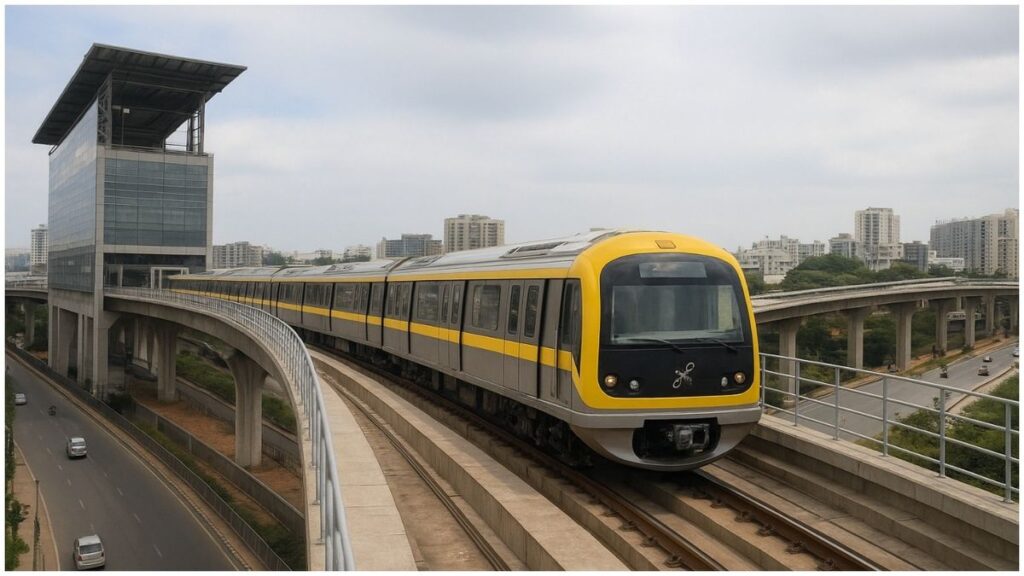The city’s metro network, fondly called Namma Metro, is set for a major expansion with the inauguration of the Yellow Line tomorrow by Prime Minister Narendra Modi. The long-anticipated line will connect R.V. Road to Bommasandra, fulfilling a long-standing dream for Silicon City’s commuters.
Also read: PM Modi to inaugurate Bengaluru’s Yellow Line Metro tomorrow; full schedule & route details here
Key Project Details
Built at an estimated cost of ₹5,056.99 crore, the Yellow Line spans 19.15 km and features 16 stations. Initially, three trains will operate on the route, with services running every 20–25 minutes and catering to an estimated 20,000–30,000 passengers daily. By 2026, the network will expand to 15 trains, increasing passenger capacity to around 3.5 lakh per day, according to the Bangalore Metro Rail Corporation Limited (BMRCL).
The stations on the route are: Bommasandra, Habbagodi, Huskuru Road, Infosys Foundation (Konappana Agrahara), Electronic City, Beratena Agrahara, New Road, Singasandra, Kudlugate, Hongasandra, Bommanahalli, Central Silk Board, BTM Layout, Jayadeva Hospital, Ragigudda, and R.V. Road.
Double-Decker Engineering Marvel
One of the standout features of the Yellow Line is its 3.3 km double-decker overpass between Ragigudda and Central Silk Board. The structure’s lower level is dedicated to vehicular movement, while the upper viaduct carries metro trains. The first level is 8 metres above the road, and the metro track is positioned 16 metres high, making it a space-efficient solution for a congested corridor.
India’s Highest Metro Station
The Jayadeva Interchange station on the Yellow Line will set a national record as India’s highest metro station, with its fifth level soaring 29 metres above ground. This multi-level interchange integrates various modes of transport: an underpass, regular road traffic at ground level, the Ragigudda–Silk Board flyover above, the Yellow Line above that, and finally, the future Pink Line on the topmost level, expected to be operational by 2026.
Driverless Train Technology
The Yellow Line will introduce driverless train technologyto Bengaluru’s metro system. While existing trains use DTG signalling, the new line adopts CBTC (Communication-Based Train Control), enabling automated operations. The first prototype driverless train was sourced from China, and Kolkata’s Titagarh Rail Systems Ltd. is manufacturing 14 additional trains for the route. Initially, trains will operate with drivers before transitioning to full automation.
Infosys Foundation Funding
Infosys Foundation has funded Konappana Agrahara metro station at Electronics City, this station has the first Platform Screen Doors (PSDs). PSDs are designed to help prevent untoward incidents at metro station. The foundation has provided around Rs 135 crore for the station. As part of the agreement reached, a dedicated walkway connects the station with the Infosys campus.
With advanced infrastructure, cutting-edge technology, and key connectivity to Bengaluru’s IT hub in Electronic City, the Yellow Line is poised to significantly ease traffic congestion and enhance urban mobility.
Also read:

